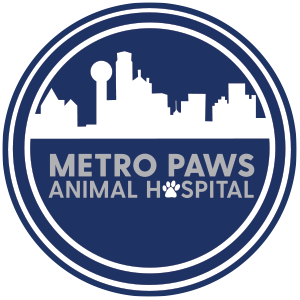By: Rebecca Donaldson, DVM
Unfortunately, we’ve all experienced diarrhea at some point and know first-hand the discomfort it causes. Our pets can experience that same discomfort if they develop diarrhea too. While not pleasant to discuss, and especially not fun to discover on our carpets, it is important to educate yourself on the subject for your pet’s continued happiness and wellbeing.
Diarrhea is the passage of feces containing excessive water. This excessive water often results in an increased stool volume and urgency of bowel movements.
What causes diarrhea?
Diarrhea can be caused by many different things, and most cases are caused by something relatively straightforward. It may be that your pet ate a new type of treat, ate too much, or was a little too stressed at daycare.
These cases may resolve on their own in a day or two. If the diarrhea persists or becomes severe, that can point towards an underlying problem, such as intestinal parasites, infection, food allergy or other illness.
My dog had one episode of diarrhea, do I need to be worried?
As long as your pet is still energetic, happy, eating and drinking normally, it is perfectly fine to monitor them at home and see if it happens again. You can feed them boiled chicken and rice (with no spices) for their next few meals to help settle their stomach. However, even initially mild cases of diarrhea can become problematic if symptoms persist. Prolonged diarrhea can lead to dehydration and electrolyte imbalances, so it is very important to closely monitor your pet and always make sure they have plenty of fresh water to drink.
If at any point your pet develops severe diarrhea or is showing signs of generalized illness such as weakness, fever, vomiting, abdominal pain, or dehydration, you should call your veterinarian right away.
How will my veterinarian help?
Your veterinarian will ask you several questions to help determine what may be causing the diarrhea. They will want to know information such as when it started, how often it has been happening, if your dog has been anywhere recently or gotten into anything, and if they are exhibiting any other symptoms. They will perform a physical exam to look for signs of dehydration, fever or abdominal pain. From all of this information, your veterinarian will choose from different tests available to pinpoint the cause, allowing them to treat it quickly and help your pet feel better as soon as possible.
Diagnostic tests may include microscopic fecal examination to look for parasites, abdominal x-rays, ultrasound, and bloodwork.
What is the treatment for diarrhea?
Treatment will depend on the cause, severity and duration of diarrhea. In simple, mild cases, your veterinarian may send home some anti-diarrheal medications or dewormers. If your pet’s case is more severe, they may need hospitalization for fluids and other supportive care until they are feeling better.
It is important to never administer any medications to your pet that have not been specifically prescribed for the diarrhea without first consulting your veterinarian. This includes over the counter medications – as they can sometimes be harmful if given with certain conditions or incorrect doses. If you have any questions about medicating your pet, be sure to call your veterinarian to discuss further.
If your vet has prescribed medications and your pet is not getting better at home after 2-3 days, it is also very important to schedule a follow-up visit as further testing and treatment may be necessary.
